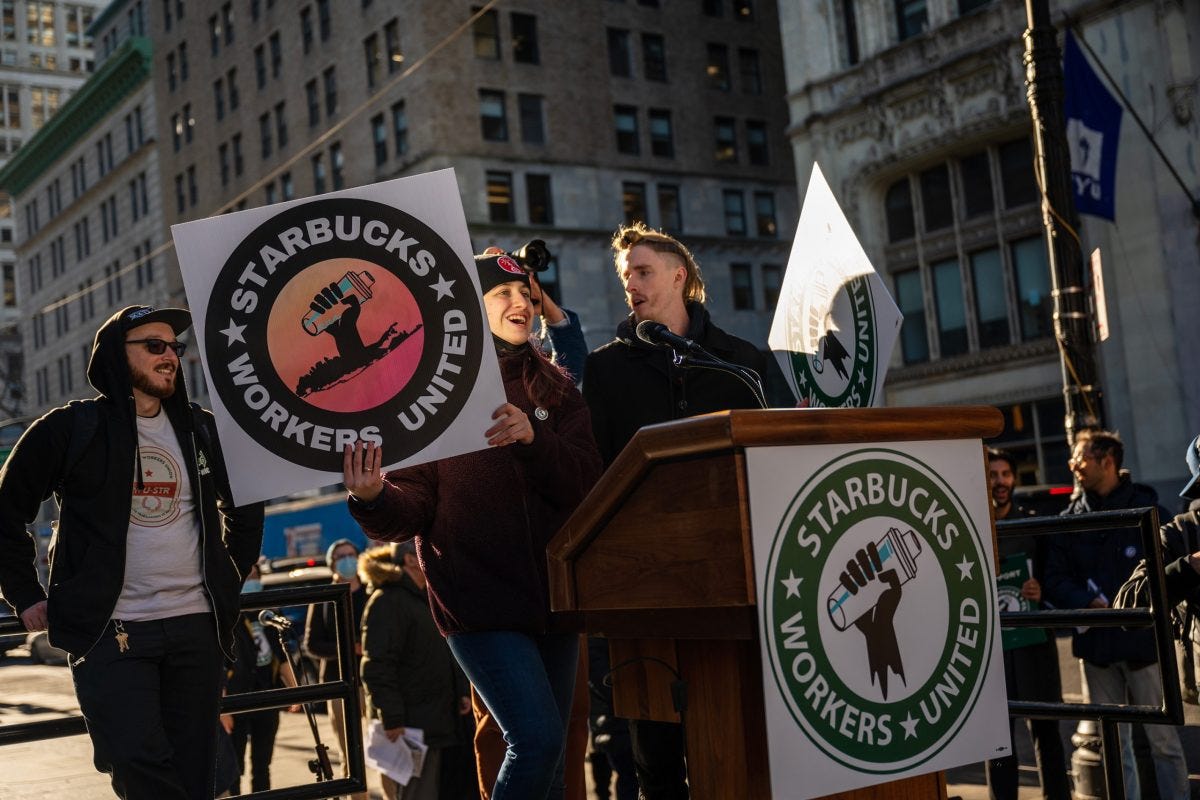09/20/2020: Starbucks Illegally Banned and Discarded Union Materials
Board affirms ALJ with different analysis.
Starbucks Corporation, 373 NLRB No. 105, 19-CA-301179 (Published Board Decision)
This case revolves around allegations against Starbucks Corporation for violating Sections 8(a)(1) of the National Labor Relations Act (NLRA) by prohibiting the possession and distribution of union materials at its Eastlake store in Seattle, Washington. The Workers United Labor Union International, affiliated with the Service Employees International Union (SEIU), had filed complaints based on these actions.
The complaint centered on allegations that Starbucks communicated to employees that they could not distribute or possess union materials on the store’s premises and discarded union materials left by an employee. Specifically, the case arose after Natalie Mattera, a barista, placed a bag of union buttons and flyers in the store’s employee area, only to later find them removed by store management on the instructions of District Manager Taylor Pringle.
The case was first heard by Administrative Law Judge (ALJ) Dickie Montemayor, who issued a decision on December 20, 2023 finding a violation of the NLRA. Starbucks appealed the ALJ’s ruling, which brought the case before the National Labor Relations Board (NLRB). The Board affirmed the ALJ’s conclusion but did so using different legal reasoning.
ALJ's Legal Reasoning:
The ALJ applied the objective test from Santa Barbara News-Press, 358 NLRB 1539 (2012) and Multi-Ad Services, 331 NLRB 1226 (2000), which examines whether the employer's conduct would reasonably tend to interfere with employees' Section 7 rights.
The ALJ cited long-standing precedent recognizing employees' rights to share union literature, including Eastex, Inc. and Republic Aviation Corp.
The ALJ characterized the area where materials were left as a "mixed use" area, noting that employers generally cannot prohibit distribution of union literature in such areas.
The ALJ found that the district manager's instruction, relayed by the store manager, was a "complete union material prohibition/directive" that was "presumptively invalid and unlawful."
The ALJ rejected Starbucks' arguments that the removal was for "housekeeping" purposes, citing the clearly articulated reason given to Mattera about the prohibition on union materials.
The ALJ also noted that non-work-related items were allowed to be posted in the back-office area, indicating discriminatory treatment of union materials.
Board's Modifications to the Legal Reasoning:
The Board did not rely on the ALJ's discussion of "mixed-use" areas, stating it wasn't dispositive given the storewide prohibition.
Instead of characterizing the manager's statement as a "directive/prohibition," the Board found it to be an orally promulgated workplace rule prohibiting employees from possessing and distributing union materials storewide.
The Board applied the Stoddard-Quirk presumption of invalidity to this rule, as it prohibited distribution anywhere in the store without exceptions for particular areas or times.
The Board addressed Starbucks' argument that a statement to one employee couldn't constitute a rule, citing cases where one-on-one conversations were found to convey overbroad rules (e.g., Starbucks Corp., 372 NLRB No. 93).
The Board more explicitly tied the removal of materials to the enforcement of the unlawful rule, citing Sprint/United Management Co., 326 NLRB 397 (1998).
While the ALJ found violations for discarding materials and communicating prohibitions, the Board consolidated these into findings that Starbucks violated Section 8(a)(1) by promulgating an unlawful rule and enforcing it by discarding materials.
In essence, the Board took the ALJ's findings of unlawful conduct and reframed them within the context of an unlawfully promulgated and enforced workplace rule, applying more specific precedents regarding no-distribution rules and their enforcement. This approach potentially broadens the implications of the decision by treating the manager's statement as a formal workplace rule rather than an isolated directive.
Significant Cases Cited:
Republic Aviation Corp. v. NLRB, 324 U.S. 793 (1945): Established that employees have the right to distribute union literature in nonworking areas during nonworking times.
Starbucks Corp., 372 NLRB No. 93 (2023) - Found violation based on one-on-one conversation conveying overbroad distribution ban.
Stoddard-Quirk Mfg. Co., 138 NLRB 615 (1962) - Established presumption against restricting distribution in non-work areas during non-work time.
Sprint/United Management Co., 326 NLRB 397 (1998) - Found unlawful discarding of union materials pursuant to unlawful no-distribution rule.

